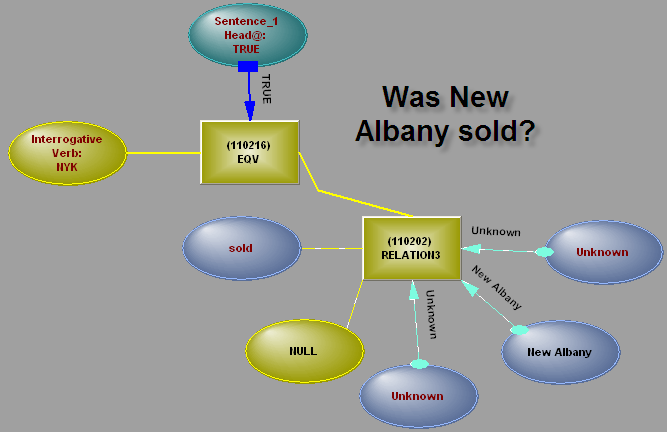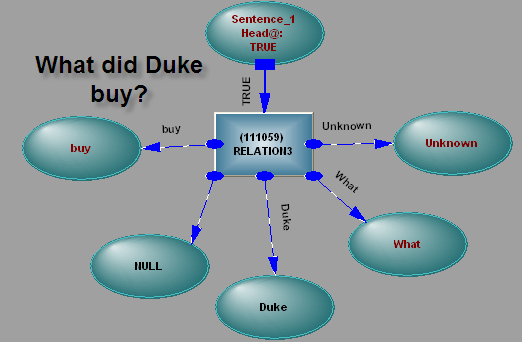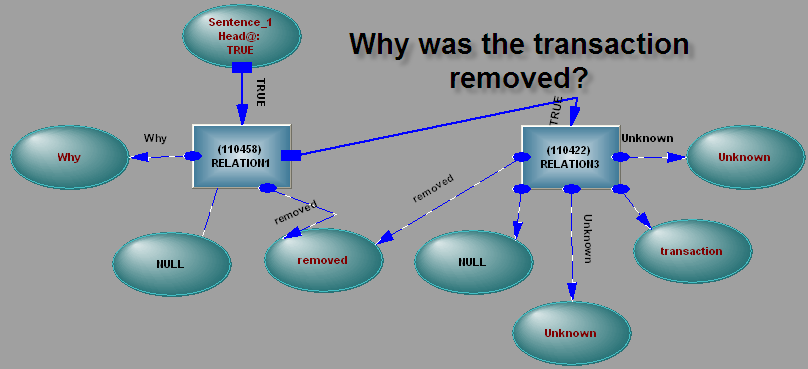
Interrogatives beginning with a verb auxiliary are transformed into a declarative form, with the logical flow reversed, as
Did Duke buy the company?
The statement is transformed into
Duke did buy the company.
No attempt is made to clean up the verb form.
To mark the statement as interrogative, the connection to the relation is built differently to the true statement.

Searching of the InterrogativeVerb – a logical – will lead to the relation, which is then matched against other relations which may provide a logical state. Subordinate conjunctions can be used, the logical searching first needing to resolve the state of the conjunctions.
The statement is transformed, the "what" moving from the start of the statement to the appropriate point after the verb and becoming marked as a search object.
Instead of "What did Duke buy?", the statement becomes "Duke did buy what".
During the transformation, verb collocations and prepositional chains are respected, so
"What did John leave out of the report?"
becomes.
"John did leave what out of the report."

Why was the transaction removed?
This says two things
The transaction was removed.
Why?
If it can be shown the transaction was not removed, that is a valid answer.

Some questions are damaged by splitting them into two seemingly independent parts.
Why is it so?
If we translate this into
Why is it the way it is?
And then transform it into two parts, we get
It is the way it is.
Why?
The question is really
Why is it not some other way?
Why is it so large?
If we transform it into
It is as large as it is.
Why?
We have lost something.
It is so large because it needs to accommodate a golf bag.
This means
It is larger than it would otherwise need to be because it needs to accommodate a golf bag.
The question is really
Why is it not smaller?
The "so" needs to modify the statement.
We could understand this as part of searching, or we could make the change during the building.
Some means is needed to connect the Why to the discourse and to the rest of the clause over which it operates. We could make Why a clausal relation, so it grabbed the relation and provided the logical true, in the same way that ToSay does. This way, it would handle an error on the logical state it was putting out. We would have
Why ClausalPronoun The transaction was removed
We could treat "why" as the equivalent of "what caused", so
Why was the transaction removed
Is transformed into
What caused the transaction to be removed
This gives searching a simpler task, although we need to take a broader view of cause.
We pay John to wash the windows.
Why does John wash the windows.
We pay him.
Why do we pay John?
To wash the windows.
How is treated similarly to Why, except that "how" can be modified, turning into a "what".
How does John wash the windows?
By what means – a bucket, a ladder.
Modifiers for How
How well does John wash the windows?
This requires a spectrum answer – badly, not very well or very well. It can be talking about the result or the process. "he does it thoroughly" will do as an answer, as well as "they are spotless".
Does John wash the windows well?
This can be answered with a yes or no, or with a spectrum.
How effectively does John wash the windows?
We can’t turn this into
How – John does wash the windows effectively
We didn’t ask how John does an effective job, we asked
How effective is the result after John has washed the windows
An interrogative prepositional phrase
For how much did we sell it?
We did sell it for how much.
For how long
Same as "how long" – might as well transform it – need to do it as a collocation, otherwise "for roughly how long" will defeat us
For what purpose – a Why equivalent